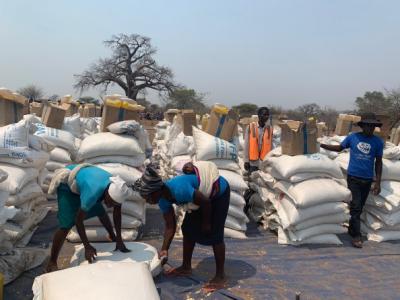WFP expands emergency operation in Zimbabwe

ROME – The World Food Programme (WFP) has issued a press statement stating that it is “rapidly expanding an already sizeable emergency operation in Zimbabwe where drought, flooding and macro-economic meltdown have plunged 7.7 million people – half the population – into severe hunger.”
The WFP says that it needs funds urgently in order to meet the increasing needs of the Zimbabweans who have been most affected. The WFP is planning to increase the number of people it I shelping to 4.1 million by January (over double the number it currently helps) by providing “life-saving” rations of cereal, pulses and vegetable oil, in addition to a “protective nutrition ration” for children under 5.
The WFP’s Executive Director, David Beasley, stated: “We’re deep into a vicious cycle of sky-rocketing malnutrition that’s hitting women and children hardest and will be tough to break.”
“With poor rains forecast yet again in the run-up to the main harvest in April, the scale of hunger in the country is going to get worse before it gets better,” he continued.
The WFP said that the situation in Zimbabwe is “part of an unprecedented climate-driven disaster” affecting southern Africa. According to the WFP, temperatures in the region are rising at more than twice the average global rate, and subsistence farmers in Zimbabwe are being particularly affected by increasingly erratic rainy seasons.
Such environmental problems are worsened by a severe lack of foreign currency, runaway inflation, increasing unemployment, lack of fuel, prolonged power outages and large-scale livestock losses, affecting people in both rural and urban areas.
The WFP describes its plans as a “huge logistical undertaking” which will include sourcing, purchasing and delivering over 240,000 tons of commodities through June – an endeavour which will be made even harder by the effects of drought and flooding, which have reduced food supplies in much of Africa.
The WFP reports that it has secured less than 30 per cent of the estimated 293 million US dollars required for its emergency response.
“We must not let our immediate focus on emergency aid distract us from investing in the resilience programs that will help chronically hungry people cope with the ever-more severe impacts of erratic weather,” Beasley said. “We urge the international community to step up funding to address the root causes of long-term hunger in Zimbabwe.”
im


